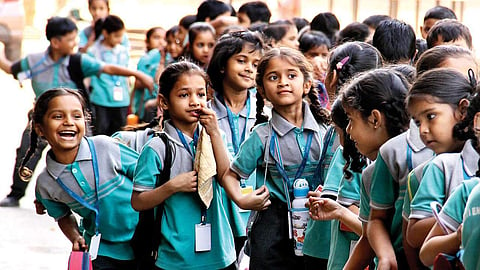

When the entire world is waiting for a vaccine as a cure for COVID-19, there are lots of other failed systems of public administration which need an immediate fix. In India, one such system which needs reform is the Education system. The National Education Policy is expected to change the way we teach and evaluate the students, though there were some voices against its implementation - but the pandemic and its effects on education activity have definitely laid stress on the need for the NEP. COVID-19 has not only brought academic activity to a standstill but has also challenged the system of education that we have bern practising for several years.
In India, the teaching profession is considered to be a not-so-hectic job, as there is an absence of a system which trains and evaluates a teacher. In most of the educational institutes, teachers are forced to prioritise on how to finish the lectures, however, with no scope for feedback and evaluation. In this approach, a teacher can easily finish the course in the limited allocated time, however, it encourages the students to adopt the surface-learning approach. Modern teaching philosophy, unlike the traditional approach, advocates for deep learning. A teacher should be a facilitator, who facilitates the deep learning to happen. In this regard, the course design is very important. The course design should be in such a way that the students get deeply involved with the learning process.
When we look at some of the other nations, a lot of research is being done on how to improve the teaching mechanism, stress is more on how much improvement a teacher can bring in himself/herself. If you are a teacher you will be required to complete pedagogic courses which are related to education methodology. Teachers focus on how abstract ideas can be designed into a digital form to make learning interesting. The evaluation process involves the students, and assessment is done in the form of quiz and games. The concept of an inverted classroom is used, where the lecture materials are provided to the students before a class and then the class starts with a warmup session. The teachers try to understand the conceptual difficulties of the students in the form of a quiz, which will also be a part of the assessment. Based on the initial assessment the teachers can focus more on the critical concepts, avoiding unnecessary time investment on simple things.
Another area of concern is the way in which we evaluate students - the Indian evaluation or assessment system is information-based, we read a lot and try to remember things only till we put it on answers sheets, and then the focus is only on getting those digits on our certificates. Why are Indian universities not preferred by students as compared to universities in foreign nation? What we lack is the focus on the actual learning that is required and this is the primary reason of not being able to produce employable resources. When compared to the west, India does not provide industry-based education system. In these countries, things are quite industry-oriented. Universities collaborate with industry to understand industries requirement and educational activity is more job-focused when compared to India.
During the period of the pandemic, education systems throughout the world has been affected, and everyone is trying their best to look for an alternative, some nations are adopting a change in teaching methodology, by shifting from offline to a hybrid model (offline + online) and steps are being taken to have a measure of the syllabus covered in order to ensure that the same is used for evaluation. We cannot afford to promote the students without evaluation as it will leave the students in a dicey situation in future, therefore an alternative for an offline examination model is a home examination. A home examination is being done by most of the universities in Europe. When it comes to home exams there are a few challenges like a student may use resources such as internet, parents and other means to answer the questions, if we use the objective form of questions, they become repetitive. In a Summative Model of assessment, the learning goals cannot be accurately measured and therefore Informative model or a Continuous assessment model should also be adopted in the form of a quiz, and questions should be framed to check the analytical ability, reasoning and critical thinking of a student.
Our Prime Minister has taken up the challenge of making India Aatmanirbhar, education system forms the base of new India. Therefore, it’s time for India to discuss and learn from these foreign models and develop its own to fit the Indian setup. A planned change in admissions, teaching, examination and results will only ensure that the Indian system withstands tough times like these in future.
Uday Inala is a Research Scholar at the University of Hyderabad, and National Secretary of Akhil Bharatiya Vidyarthi Parishad. Dr Biplab Paul is an Assistant Professor in the Physics Division of Linköping University, Sweden. The views expressed here are the authors' own
